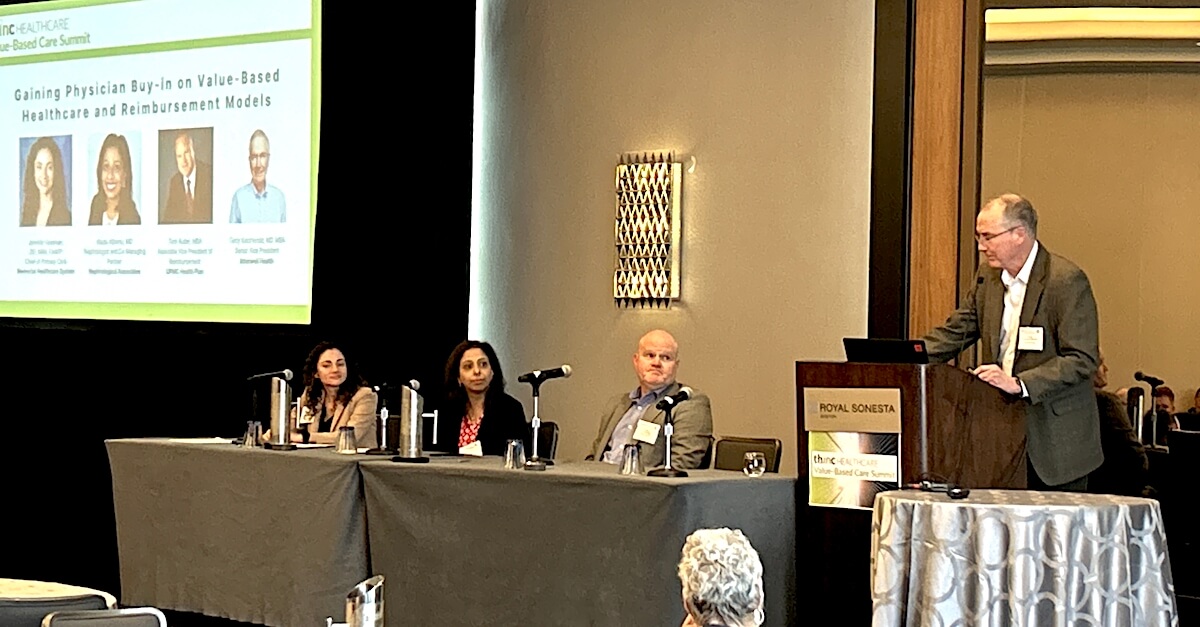Physicians Agree Success in Value-Based Care Requires New Workflows and Actionable Data
Creating clear and consistent workflows and combining those with analyzed and actionable data are key to nephrologist buy-in for value-based care.
tags

Creating clear and consistent workflows combined with actionable data to drive change were identified as key to physician buy-in for value-based care during a panel discussion at the 2023 ThiNc Value-Based Care Summit in Boston. The conference brought together almost 200 healthcare professionals engaged in finding innovative solutions that improve quality of care while lowering total costs.
“In a fee-for-service world, nephrologists would opt-in to offer kidney disease education to their patients,” said Dr. Terry Ketchersid, Senior Vice President of Interwell Health, who moderated the discussion. “In value-based care arrangements, we have seen practices create workflows that require providers to opt-out of making kidney care education available to their patients. A simple change like that can make a huge difference.”
The physician buy-in panel included insights from Dr. Kezia Alberto of Nephrological Associates in New Jersey, Dr. Jennifer Goldman, Chief of Primary Care for Memorial Healthcare Systems in Florida, and Tom Aubel, Associate Vice President of Reimbursement for UPMC Health Plan in Pittsburgh.
“As nephrologists, we are trying to slow the progression of disease, divert patients to transplantation, or refer them to home dialysis instead of in-center,” explained Dr. Alberto. “In a value-based care world, we have established new workflows that help us provide the same level of high-quality care regardless of the payer and we are beginning to see meaningful results.”
Both Goldman and Aubel commented on how delivering too much data to physicians can be a barrier when shared in aggregate without context. They explained how clear, properly analyzed, and actionable data, can impact behavior of physicians within a value-based care contract, resulting in improved outcomes.
“In order to integrate into the lives of primary care providers, you can’t come with reams of data and say you have a problem,” said Goldman. “You have to come to physicians with recommendation and a plan of action. And that only really works if you have an integrated approach.”
“If you back up the truck and dump data, it really doesn’t work,” Aubel said. “The data we present physician practices in our network try and show the doctors what is actually going on with their patients. Getting those conversations going with our providers can really accelerate change.”
The panel also discussed the importance of looking at social determinants of health as part of the value-based care model. Goldman explained that adding screenings to the workflows, with automatic referrals, can make a big difference for patients struggling with transportation, housing, or food insecurity.
Integrating social determinants of health screening in the workflow is one of the most important things we can do in value-based care. -Dr. Kezia Alberto
All panelists agreed that independent physicians cannot succeed on their own when having to pay for resources up front. It is difficult to convince providers to invest in new tools and ways of working that may only realize financial benefits in a year or more.
Ketchersid explained how Interwell Health’s model for value-based kidney care aims to bring physicians to the center of this shift, ensuring they are partners from the very beginning in identifying the changes and resources that will have the most impact on patient outcomes.
“The one thing we have clearly seen work is to simply provide physicians with the resources they need to succeed in value-based care,” he said. “Value-based care provides a funding mechanism for resources that no one can actually afford to pay for in traditional fee-for-service.”
The ThiNC Value-Based Care Summit took place at the Royal Sonesta Boston from January 26-27, 2023.